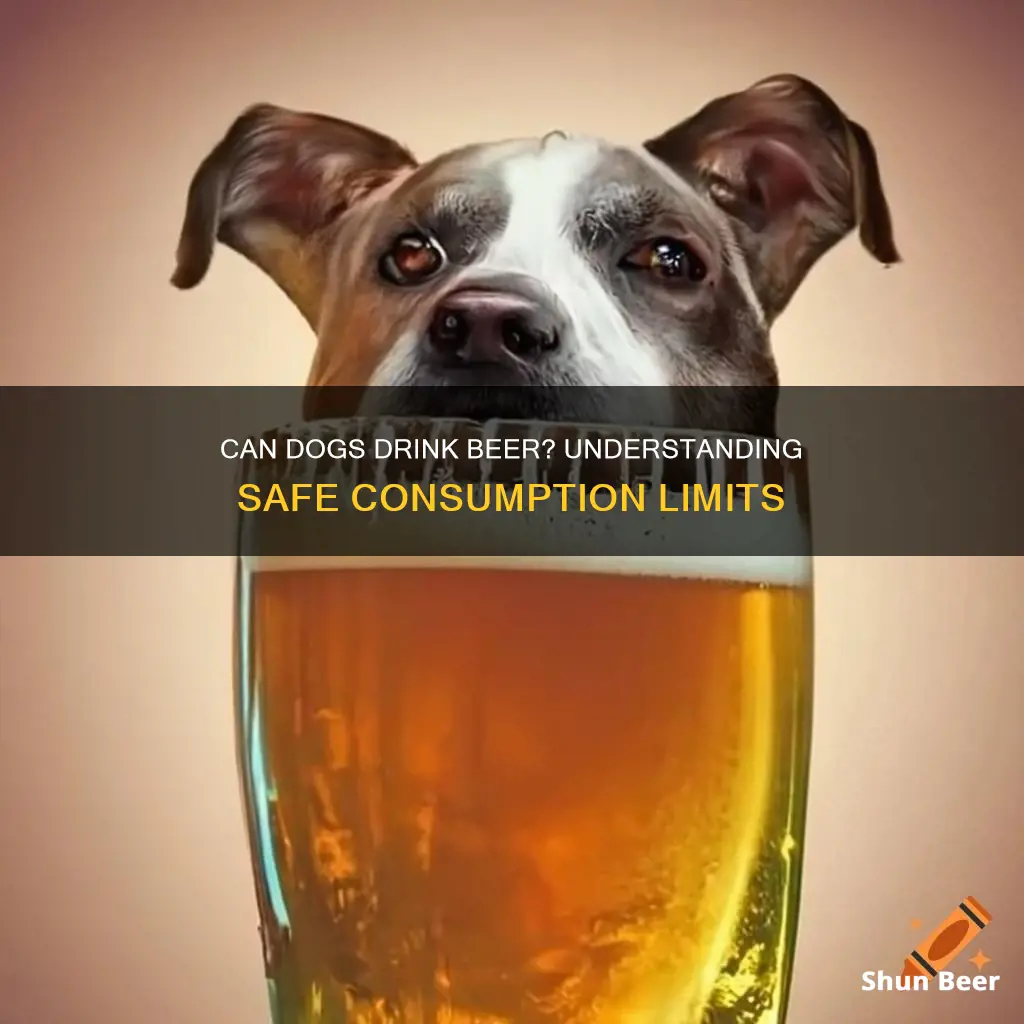
Dogs should never drink beer, as even a small amount of alcohol can be toxic and cause alcohol poisoning. Beer contains ethanol, which is produced during the fermentation process and gives humans a dizzy, tipsy, wobbly feeling. It takes very little alcohol for poisoning to develop in animals, and even a few licks of beer can be enough for small dogs to appear drunk. Symptoms of alcohol poisoning in dogs include vomiting, disorientation, lack of coordination, tremors, seizures, lethargy, decreased breathing rate, low body temperature, and low blood sugar. If you suspect your dog has consumed any alcohol, you should contact an emergency vet immediately.
What You'll Learn

Beer can cause brain damage in dogs
Beer and other forms of alcohol are toxic to dogs and can cause alcohol poisoning, even in small amounts. Dogs are highly sensitive to the effects of alcohol, and it doesn't take much for poisoning to develop. Even a few licks of beer can be enough for small dogs to appear drunk, and a drunk dog has likely been poisoned.
Alcohol affects dogs much like it does humans, and they can experience similar symptoms of intoxication and poisoning. These include depression or lethargy, lack of coordination, vomiting or retching, decreased respiratory rate, low blood sugar, low blood pressure, and low body temperature. However, unlike humans, dogs do not know what to expect and are affected much quicker, usually within 30 minutes of ingestion.
The amount of alcohol and the weight of the dog will determine how fast they get alcohol poisoning. Smaller dogs are more susceptible to intoxication, and even a little beer can cause alcohol poisoning in toy breeds. If your dog is staggering or disoriented, go to the emergency vet immediately.
In addition to the immediate health risks, research has shown that alcohol can cause changes to the structure of a dog's brain and lead to cardiovascular concerns. In a worst-case scenario, alcohol consumption can be fatal for dogs.
Therefore, it is essential to keep beer and other alcoholic beverages away from dogs and never deliberately offer them as a treat. While it might be tempting to share a drink with your furry friend, plain water is the best choice for your dog's health and hydration.
Chug a Pitcher of Root Beer: Tips and Tricks
You may want to see also

Even a small amount of beer can be toxic to dogs
Dogs are curious creatures and love to consume things, exploring with their mouths. They may be attracted to beer because of its sweet taste or its smell. They may also want to drink beer because their human family members are drinking it. However, it is important to keep beer and other alcoholic drinks away from dogs.
If a dog consumes beer, they can quickly develop alcohol poisoning. The amount of alcohol and the weight of the dog determine how fast they get alcohol poisoning. Dogs are smaller than humans, and even a small taste of anything potentially harmful can be irresponsible and even cruel. Beer can harm dogs in unexpected ways, including brain damage, and a dog that seems drunk has likely been poisoned.
The signs of alcohol poisoning in dogs include vomiting, disorientation, lack of coordination, tremors, and seizures. In severe cases, intoxication can lead to a coma and even death. If your dog appears drunk after drinking beer, you should head to the veterinarian right away.
Drinking Beer While on Dexilant: What You Need to Know
You may want to see also

Dogs can absorb alcohol through their skin
It's important to know that dogs should never consume beer brewed for humans. Beer contains alcohol, and alcohol is toxic to dogs. Even a small amount of alcohol can cause alcohol poisoning, especially in smaller dogs.
If a dog consumes alcohol, they may appear drunk, confused, or have difficulty walking and standing. Additional signs of alcohol poisoning include decreased breathing rate, low blood sugar, low body temperature, abnormalities in electrolytes, and seizures.
If you suspect your dog has consumed alcohol, contact your vet immediately. Do not try to treat alcohol poisoning at home. The vet may induce vomiting to help remove the alcohol from the dog's digestive system.
To prevent accidental consumption, keep alcoholic beverages away from dogs and never leave them unattended.
Enjoying Beer on Naples Beach: What You Need to Know
You may want to see also

Beer can lead to cardiac arrest in dogs
Cardiac arrest in dogs is a serious and potentially life-threatening condition. While there are many causes, one that is often overlooked is the consumption of beer. Beer contains high levels of alcohol, a substance that is extremely toxic to dogs. Even small amounts of beer can lead to alcohol poisoning and, in severe cases, cardiac arrest. The effects of alcohol on a dog's heart can be rapid and severe. As a central nervous system depressant, alcohol affects the cardiovascular system, causing a drop in blood pressure and a slowed heart rate. This can lead to a state of shock, and the dog may collapse.
The toxic effects of alcohol can also cause a dog's blood sugar levels to drop rapidly, leading to weakness, disorientation, and seizures. As the dog's body attempts to compensate for these changes, the heart rate and blood pressure may then spike, leading to an irregular heartbeat and, potentially, cardiac arrest. Even small amounts of beer can have these effects, and the risk is heightened if a dog consumes beer regularly or in large quantities. Dogs with pre-existing heart conditions are particularly at risk and are more likely to suffer from cardiac arrest if they consume alcohol.
The effects of beer on a dog's heart can be life-threatening, and immediate veterinary attention is required if you suspect your dog has consumed alcohol. Treatment may involve stabilizing the dog's vital signs, and in some cases, intravenous fluids and medication may be necessary. With prompt treatment, many dogs can make a full recovery, but it is essential to act quickly to prevent long-term damage or, worse, a tragic outcome. It is important to keep beer and all forms of alcohol well out of the reach of curious canines.
Additionally, it is worth noting that dogs can also experience alcohol toxicity by consuming raw bread dough containing yeast. As the yeast ferments the sugars in the dough, it produces alcohol, which can then be absorbed into the dog's bloodstream. This can lead to similar toxic effects, including cardiac arrest. Therefore, it is crucial to be vigilant not only about direct alcohol consumption but also about potential sources of alcohol, such as unattended bread dough.
Drinking Beer on Mustang Island: What You Need to Know
You may want to see also

Signs of alcohol poisoning in dogs
Dogs should not be drinking beer or any other alcoholic beverage. Even a small amount of alcohol can be toxic to dogs and cause alcohol poisoning. If you suspect your dog has consumed alcohol, contact your vet or a pet poison helpline immediately.
- Excessive sleepiness or lethargy
- Stumbling gait or mild staggering
- Lack of coordination or incoordination
- Disoriented behaviour
- Nausea or vomiting
- Depressed central nervous system
- Low body temperature (hypothermia)
- Low blood sugar (hypoglycemia)
- Low blood pressure (hypotension)
- Low heart rate (bradycardia)
- Increased thirst and frequent urination
- Slow respiratory rate or difficulty breathing
- Tremors or seizures
- Coma
If you notice any of these symptoms in your dog, seek veterinary assistance immediately. Do not try to treat alcohol poisoning at home. The vet may induce vomiting to remove the alcohol from the dog's digestive system or provide other supportive care, depending on the time since ingestion and the dog's condition.
Beer and Abs: Can You Have Both?
You may want to see also
Frequently asked questions
Dogs should not drink beer or any other alcoholic beverages under any circumstances. Beer contains ethanol, which is rapidly absorbed by a dog's digestive tract and cannot be metabolized by their bodies. Even a small amount of beer can be toxic to dogs and cause alcohol poisoning.
Signs of alcohol poisoning in dogs include vomiting, disorientation, lack of coordination, tremors, seizures, lethargy, decreased respiratory rate, low blood sugar, low blood pressure, and low body temperature. If you notice any of these symptoms, contact your veterinarian immediately.
If your dog drinks beer, remove the beer from their reach and contact your veterinarian immediately. Do not induce vomiting unless instructed to do so by a veterinarian. Provide the veterinarian with information such as the amount of beer consumed, the time of exposure, and any abnormal signs your dog is exhibiting.
To prevent your dog from drinking beer, keep beer bottles and cans out of their reach, do not leave open glasses of beer unattended, stay informed about hazardous cleaning materials, and avoid alcohol-containing foods. Inform your guests not to give their beer to your dog, and consider keeping your dog in a separate room when consuming alcohol.







